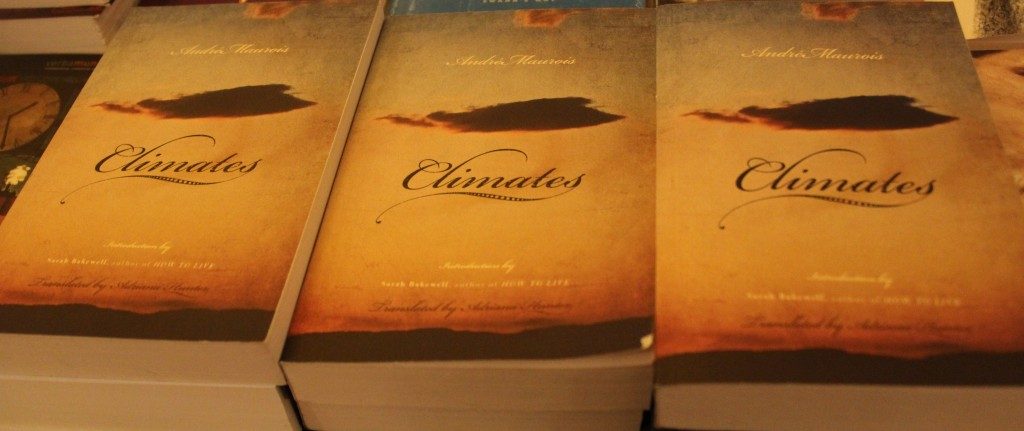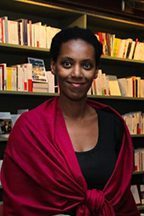Climates

Othello, Phedre, Tolstoy’s Kreuzer’s Sonata, Dostoievsky’s Eternal Husband, Proust’ Swann’s Way or Svevo’ Senilita prove, if needed be, that has inspired many literary masterpieces. Climates undoubtedly belongs to this prestigious lineage. Its author, André Maurois,a French writer, better remembered today for his biographies than his novels, first published Climates in 1928 to international acclaim and we must thank Other Press for wresting this little jewel out of oblivion and offering us a chance to discover it again in Adriana Hunter’s remarkable translation.
Set in the heart of the Roaring Twenties in France, Climates is the account of Philippe Marcenat’s two marriages. While the first union is narrated by Philippe, the second one is told from the perspective of Isabelle, Philippe’s second wife, after her husband’s demise. Philippe is the unique son of a respectable family of industrialists established in Gandumas, a small town in the vicinity of Limoges. According to his own words, within the Marcenat’s household: “Any form of conversation was made difficult by my father’s extraordinary sense of propriety… It was taken for granted that all conventional feelings held true, that parents loved their children, children their parents, and husband their wives. The Marcenats like to see the world as a decent earthly paradise”
In this atmosphere, the young Philippe grows up in a considerable amount of silence and solitude, and when entering adolescence, he finds it difficult to reconcile his petit-bourgeois upbringing with his inclination for an elite culture, not to mention his precocious talents as a womanizer. While enjoying the pleasures of a comfortable bachelor’s life, Philippe has no doubt that someday, he will meet his amazon and that she will turn him into a happy and faithful man, just like his father.
On a convalescence trip to Italy, Philippe crosses the path of Odile Malet and he is immediately taken by her grace, elegance and striking beauty. Upon their return and despite the poor reputation of the Malets, Philippe proposes to Odile. Her mother is said to have lovers and her father is considered “a pleasant man who had some talent but never any success because he never does any work.” No wonder that Philippe’s relatives are less than enthusiastic towards what they unanimously consider a misalliance.
Indifferent to their entourage, the two lovebirds have only eyes for each other and they make their nest in Paris. But as their love moves from the stage of crystallization to the routine of conjugal life, the first ordeals appear. Odile’s inclination towards secrecy and autonomy soon provoke Philippe’s jealousy which, in a vicious circle, inevitably pushes Odile further away until the day she meets the handsome navigator, François, who captures her for good.
Philippe’s second marriage starts like a repetition of his first, with the noticeable difference that, this time, Philippe is the one who is loved while his sweet wife is consumed by jealousy. And the very same Philippe who formerly enjoyed nothing more than staying at home to chit-chat with his wife, now shows a reckless curiosity for Paris’ nightlife, its theaters, concerts and even the evenings at Hélène de Thianges, a sought-after salon. Furthermore, Philippe now seems delighted by the company of women whose existence he wouldn’t even have noticed when married to Odile.
Some characters have changed and some have switched roles, but jealousy is the same old song. Tolstoy and Proust have respectively used Beethoven’s Kreuzer’s Sonata and Vinteuil’s Sonata as metaphor to incarnate the obsessive quality of jealousy: jealous people don’t change, they simply can’t, as they are prisoners of their own essence. Thus they are doomed to play the same score over and over again. As Philippe wrote in his diary: “In this drama of love, we take turns in playing the role of the more loved and the less loved. All the lines then switch from one performer to the other, but they stay the same.”
André Maurois breaks down this endless dance, step by step, with remarkable wit, insight, and, most importantly, with a troubling honesty.
As Adam Phillips notes in his book On Flirtation, lovers and jealous people are: “detectives who recklessly seek the little something that will radically differentiate the object of their affection from the rest of the world. They begin with prolifically inventing illusions about each other only to be disappointed by the truth. But when Isabelle claims: “We are wrong to say that love is blind,” she points out the essential difference between lovers and jealous people: true love is not blind, only jealousy is.'”
In French, the word jealousy also refers to a specific window shade — a set of mobile and horizontal stripes — that prevents you from seeing through it. Jealousies call upon your imagination. They force you to guess, to envision what is happening on the other side. Twenty-nine years before Alain Robbe-Grillet would publish his eponym novel, André Maurois presents jealousy as a poison that affects your mind and your view so much so, that halfway through the story, he is forced to switch narrator to fully embrace the complexity of the tragedy. The jealous one is only in love with a perfect image, nothing more than a total illusion. And this fact doesn’t escape Philippe who, in a flash of lucidity, comments: “Our feelings are all too often only the images of our feelings. I could free myself from this obsession with Solange in a flash if I agreed to look at the real Solange, the one I have had in me ever since I met her, which has always been in me, drawn by a cruel, exacting master and that I refuse to see.”
It is hard not to ear behind Philippe’s words the echo of Swann’s complaint: “To think that I have wasted years of my life, that I have longed for death, That the greatest love that I have ever known has been for a woman who did not please me, who was not in my style!”
The wise, generous and devoted Isabelle will find in her heart the capacity to overcome her jealousy and accept her husband as he is, with his childish and narcissistic longing for a perfect love. Could there be any greater love than that?
“The really important thing, I’ve realized in the last year, is that if we really love, we mustn’t attach too much importance to the things that the people we love do. We need them; they alone mean we can live in a particular “atmosphere” (your friend Hélène calls it’s a ‘climate’ and that’s absolutely right) that we can’t get by without. So long as we can keep them, hold on to them, good god, what does the rest matter?”
Miriam
Climates by André Maurois, a novel translated by Adriana Hunter, Other Press, 2012.


